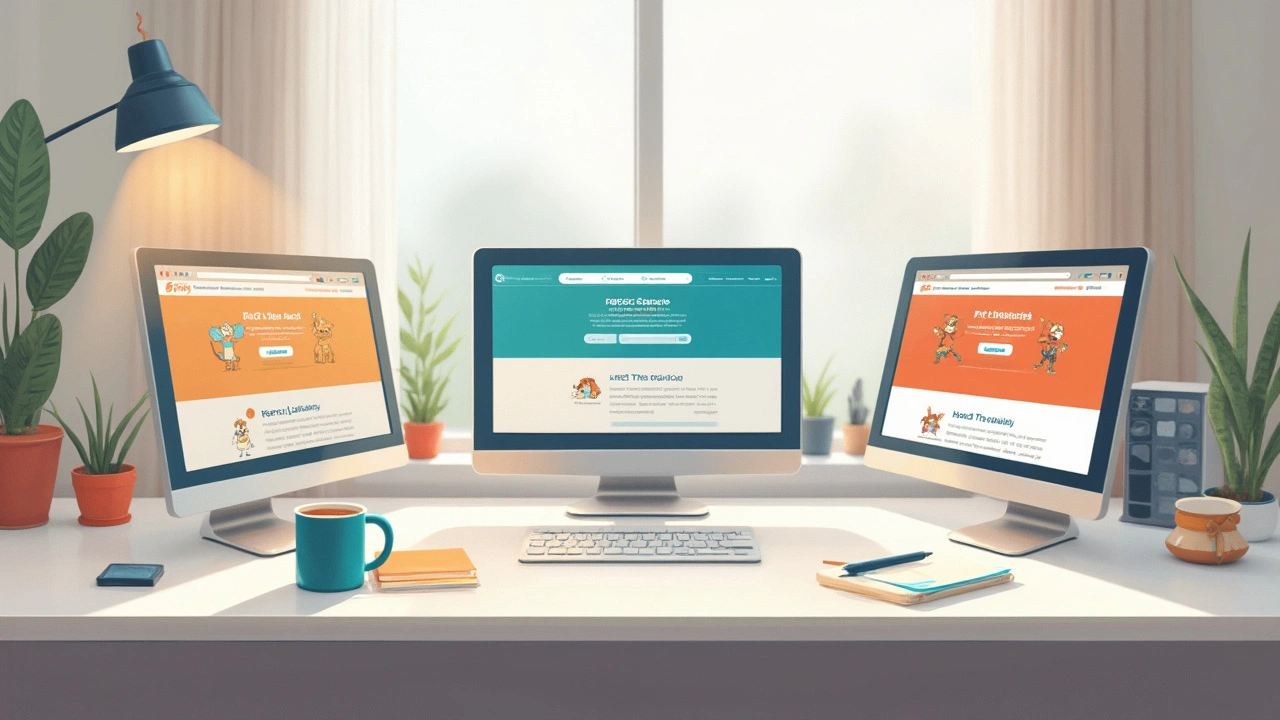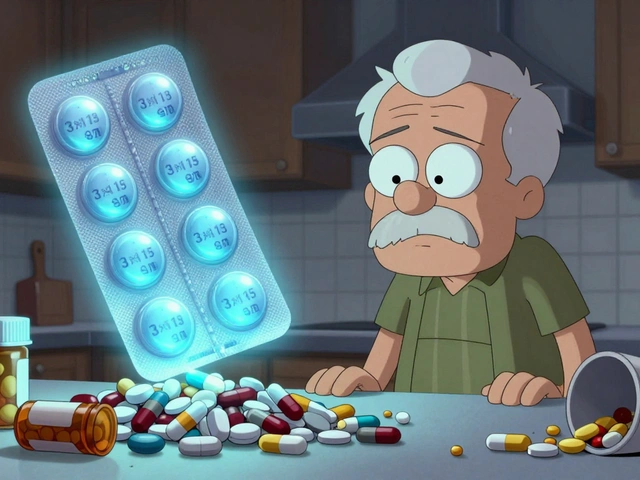Ever typed in a weird ache or rash on WebMD and instantly convinced yourself it's something wild and rare? Yeah, you're not alone. Sizeable websites like WebMD have been go-tos for years because they come up first, not always because they're easiest to use or the clearest. Good news: by 2025, newer health sites have stepped up, offering focused answers and solid facts without sending you into panic mode.
If you’re juggling work, family, and maybe a pet or two (like Leo and Max at my place), you want health info that just makes sense, no medical degree needed. Each of these alternatives has its own flavor. Some are all about the latest medical news, some break big topics down into bite-sized tips, and others stick to the cold, hard science—if that’s your thing. Not every site is perfect. Some run more ads, some go shallow on details, and some lean heavy on doctor-speak. But they all have clear strengths over the usual WebMD routine.
This isn’t about just ditching WebMD. It’s about finding smarter ways to get health answers—without all the stress and confusion. Let’s check out five sites that really give you options in 2025.
- Medicalnewstoday.com
- Verywellhealth.com
- MayoClinic.org
- Healthline.com
- ClevelandClinic.org
- Summary Table & Takeaways
Medicalnewstoday.com
If you’re after health news that actually makes sense, Medicalnewstoday.com is tough to beat. This isn’t just another repackaged copy of what’s trending. Instead, you get a steady feed of medical breakthroughs, nutrition deep-dives, and wellness trends—updated pretty much daily. The layout stays simple, so you won’t waste half an hour clicking around to figure out what’s new. For busy folks, that’s a big win.
What makes this site easy to trust is its focus on linking out to peer-reviewed sources. They’ll break down complex studies so the rest of us don’t need a science background. For example, during the 2024 allergy season spike, their explainers on new over-the-counter options and what’s hype versus what’s real were some of the clearest out there. If you want both the quick version and the ability to dig deeper, you’re covered.
The articles don’t just talk about diseases and conditions—they mix in practical stuff on nutrition, mental health, and fitness too. Multimedia like short videos, interactive infographics, and even Q&A sessions help shake up the text-heavy vibe you get from other medical websites. You’ll find everything from gluten-free diet tips to sleep science updates without having to jump around.
Pros
- Stays on top of breaking medical websites and health stories—sometimes faster than classic news outlets.
- Wide range of topics, including hard science and real-life wellness tips.
- Easy-to-understand language, good for both parents and teens.
- Peer-reviewed references so you don’t have to guess if info is legit.
- Loads of videos and interactive content for visual learners.
Cons
- Some articles can be a bit surface-level—if you want medical deep-dives, you might want to follow the reference links.
- They do run sponsored content, so you’ll spot ads and product mentions here and there.
Here’s a quick peek at how Medicalnewstoday.com updates stack up over the last year:
| Topic | Number of Articles (2024-2025) | Peer-Reviewed? |
|---|---|---|
| Nutrition & Diet | 340+ | Most |
| Mental Health | 200+ | Yes |
| Medical Breakthroughs | 180+ | Yes |
So if you’re tired of guessing whether what you’re reading is up-to-date, Medicalnewstoday.com is a solid pick for 2025. It’s fast, smart, and pretty no-nonsense—exactly what most of us need when health questions pop up.
Verywellhealth.com
Verywell Health has earned a reputation for making health info easy to understand, especially for people who just want the facts. It’s written with real life in mind—think clear charts, checklists, and step-by-step guides you can actually use. The team includes doctors, nurses, and health journalists, but everything gets a down-to-earth tone. If you've ever felt buried by fancy medical words, this site cuts through that clutter big time.
Unlike sites that talk at you, Verywell encourages taking control of your health with practical advice. Its articles often come with visual aids—infographics, progress trackers, self-check quizzes—that help the info stick. The design is friendly and calming (fewer pop-ups, softer colors), which somehow makes reading about a weird rash a little less stressful. If you care about up-to-date medical info but don’t want homework-level research, this is a strong pick.
Pros
- Accessible explanations—great for anyone who wants clear, simple answers.
- A huge range of topics: symptoms, tests, nutrition, mental health, parenting, and more.
- Updated content: they launch reviews whenever guidelines change, so you’re not reading old advice.
- Expert-reviewed, so you know a real doctor or nurse signed off on each topic.
- User-friendly interface—easy to search, no complicated navigation.
Cons
- Sometimes articles can feel a bit surface-level for folks who want scientific deep dives.
- There’s some sponsored content, so it’s worth double checking if you’re reading an ad or a regular post.
- U.S.-centric focus: guidelines for meds and treatments are American, so other users may need to cross-check.
Just for a feel, here’s how Verywell Health measures up on a few important health website features. It gets especially high marks for readability and visual aids:
| Feature | Verywell Health Rating |
|---|---|
| Readability | 9/10 |
| Up-to-date Content | 8/10 |
| Expert Review | 8/10 |
| Depth of Info | 6/10 |
If you like health answers in plain English—or want to help your parents or kids find solid info without confusion—Verywell Health is a no-nonsense option to keep bookmarked. It’s a breath of fresh air compared to old-school, overly technical sites.
MayoClinic.org
When you need trustworthy answers about health, MayoClinic.org is one of the first places people turn in 2025. The brand itself—Mayo Clinic—comes with serious credibility, since their doctors and researchers are behind pretty much everything you see on the site. Unlike some health websites that pull info from all over the internet, this one keeps it tight, making sure every article goes through a medical review before it gets published.
One thing you’ll notice right away: everything is written in plain English. They’re not trying to impress you with medical jargon but to make complicated stuff like diabetes or high blood pressure human and understandable. All those disease pages come with images, symptoms checklists, and step-by-step guides on what to do next. It makes it easy for families or even kids to follow.
MayoClinic.org has a useful tool if you’re sorting through symptoms—called the Symptom Checker. Pop in what’s going on and it suggests possible causes. Here’s the part people love most: instead of just scaring you with worst-case scenarios, it tells you how soon you need to act, if home care might work, or if it’s time for a doctor’s visit.
| Mayo Clinic Traffic in 2024 | Fun Fact |
|---|---|
| Over 35 million monthly visitors | Most common searches: migraine, anxiety, high blood pressure |
The site also keeps ads and paid promotions minimal, so you can read without distractions—huge plus when your patience is wearing thin (maybe one too many late nights with a sick kid!).
Pros
- Information is backed directly by Mayo Clinic’s medical experts
- Plain language, nothing confusing or high-level
- Symptom Checker and visual guides help you act fast
- Minimal ads and clear layout
Cons
- Some topics can feel repetitive if you check for updates often
- Focuses mainly on common conditions, so rare problems might not be covered thoroughly
If you want info you can really trust, without hunting through endless internet threads or popups, MayoClinic.org is honestly one of the best alternatives to WebMD.com right now.

Healthline.com
If you’re on the hunt for no-nonsense health info that’s easy to scan and even a bit friendly, Healthline gets it right. They’re big on breaking down medical stuff into normal, understandable language, which is such a relief when you’re worried and need straight talk. Healthline covers everything—from common illnesses and nutrition myths, to managing stuff like anxiety, diabetes, or even coping with tech neck (yep, that’s a thing now).
This site stands out for its strong editorial checks. Healthline’s articles aren’t just slapped together; every piece gets reviewed by doctors and healthcare experts before it makes it online. In fact, their medical review team includes over 100 professionals, which is more than most other sites in this lineup. That means you’re a lot less likely to stumble on outdated or shaky advice.
A surprising plus: Healthline’s guides for parents, pet owners, and people dealing with chronic health issues come packed with day-to-day tips you can really use. For example, if you have a chronic condition or wondering whether to worry about your dog Max’s allergies, Healthline usually has fresh, seasonal advice ready to go. The layout is simple—big headings, bold bullet points, and hardly any medical jargon.
Also worth mentioning: Healthline packs a lot of useful comparison charts, symptoms checklists, and quick-read tables. Check this out for a taste:
| Common Health Need | Healthline Content Type | Speed of Update |
|---|---|---|
| Cold/Flu | Guides, Symptom Trackers | Updated every season |
| Mental Health | Self-Test, Video Stories | Monthly |
| Chronic Conditions | Expert Tips, Newsfeeds | Weekly |
Now, Healthline does have ads—and sometimes it feels like you’re walking through a neighborhood with a lot of billboards. But if you can ignore the occasional promo for supplements, the site keeps things honest and always spells out when something’s sponsored.
Pros
- Every article is doctor-checked for accuracy, which really helps with peace of mind.
- User-friendly for non-medical folks—lots of visuals, FAQs, and quick bullet points.
- Big focus on common issues—mental health, chronic pain, seasonal health problems—that real families care about.
- Regular updates, so you see the latest treatment options and advice every time flu season rolls around.
Cons
- Noticeable ad content can sometimes break up articles in weird spots.
- They stick to mainstream medicine, so if you’re looking for deep-dive research or niche rare conditions, they might fall short.
- Some interactive tools are only available in the US or lag behind for global visitors.
Bottom line: Healthline is your reliable buddy for health info that won’t leave you scared, lost, or more confused than when you started. It’s perfect if you want answers fast, minus the overload of scary possibilities.
ClevelandClinic.org
If you're searching for real-deal medical advice online in 2025, ClevelandClinic.org definitely has your back. This website isn’t just someone’s health blog or a clickbait jungle—Cleveland Clinic is one of the top U.S. hospital networks. Their site pulls together expert knowledge from doctors who actually treat patients every day. Sometimes you just want clinical, fact-checked info instead of a list of worst-case scenarios, and that's exactly what you get here.
What’s handy is the way ClevelandClinic.org organizes its resources. There's a clean search bar right up top. Pop in "migraine," "child asthma," or "low blood sugar," and you’ll usually land straight on an article written and reviewed by in-house doctors. Content is updated as guidelines and medical standards change, so you aren’t stuck with outdated advice—if the CDC updates flu shot timing, it’ll show up on their pages pretty quickly.
The site covers:
- Clear explanations for medical conditions—nothing gets too jargon-heavy.
- Guides on making healthy choices for food, exercise, and mental health.
- Details about treatments and what to expect before or after a hospital visit.
- Specific pages for parents, seniors, and even pet owners (although Max’s vet still beats online wisdom any day, just saying).
ClevelandClinic.org also does a nice job with simple infographics and short videos, in case you don’t have time to read. If I need to double-check something before Flynn’s checkup, this is often my “get to the facts” stop.
Pros
- Highly credible—content written by licensed medical pros actually working at a hospital.
- Fast to update info and quick to add new health developments.
- Articles cover common health concerns, rare diseases, and practical well-being tips.
- Search-friendly, skips most of the pop-ups and distractions other sites push.
Cons
- It’s not as breezy as some health blogs, so articles can feel a bit textbook-like.
- Personal stories are rare—it's mostly focused, clinical advice.
- Not much on trendy wellness topics or alternative treatments—more old-school medicine.
| Feature | Available? |
|---|---|
| Video Guides | Yes |
| Condition Database | Extensive |
| Interactive Symptom Checker | No |
| Doctor Q&A | Occasional |
If you've ever felt let down by vague advice on bigger sites, this one's worth bookmarking. ClevelandClinic.org keeps things straight to the point—something that's always welcome when you want fast, reliable health answers for yourself or the family.
Summary Table & Takeaways
When you're browsing health sites, it's easy to get lost in the noise. The key thing is to match your needs—fast answers, deep details, or the latest studies—to the webmd alternatives that do it best. You’ve got options, each with their own flavor, so let’s make this simple with a side-by-side look:
| Website | Known For | Pros | Cons |
|---|---|---|---|
| Medicalnewstoday.com | Health news, nutrition, wellness updates | Timely updates, wide variety of topics, easy explanations | Less depth, some commercial bias |
| Verywellhealth.com | Clear guides and practical tips | User-friendly, made for real people, great images | Sometimes too basic, ads can bug you |
| MayoClinic.org | Trusted, doctor-reviewed content | No-nonsense info, reliable, detailed condition guides | Not flashy, can feel old-school |
| Healthline.com | Health news plus expert-written content | Super accessible, visual guides, lots of wellness | Occasional ads and “listicles” |
| ClevelandClinic.org | Hospital-backed resources | Research-driven, patient info, up-to-date treatments | Medical-heavy, sometimes less beginner-friendly |
All these sites outrank WebMD these days in at least one way: they’re easier to read, more current, or just less likely to set off alarm bells over every sniffle. Medical websites like Mayo and Cleveland Clinic are doctor-backed if you want the hard science. If simplicity is king in your house (especially when wrangling little ones, pets, or a busy schedule), Verywellhealth.com or Healthline.com can save you time and sanity.
A quick tip: if you find a fact or diagnosis, double-check it across at least two trusted health information sites. Even the best sites miss things. Bookmark your favorite, but don’t be afraid to mix it up. That’s how you get the clearest answers—and less stress next time you end up on a late-night health search.







Tim Giles
July 17, 2025 AT 22:28This article certainly comes at a timely moment when many individuals feel overwhelmed by the sheer volume of medical information online, particularly when it comes to platforms like WebMD, which can sometimes lead users down a rabbit hole of uncertainty rather than certainty. I appreciate the fact that the article offers a curated list of alternatives, especially given how critical it is to access reliable medical information in an easy-to-understand format. It makes me wonder about the criteria used to judge the reliability and clarity of these alternative sites. Are these websites vetted by medical professionals or do they incorporate user feedback to improve accuracy? Also, the mention of specific user groups such as busy parents and pet lovers intrigues me because different demographics must have very different needs when seeking health information. It would be beneficial if the article elaborated on how each alternative tailors its features for particular audiences. Lastly, I’d love to hear about the balance each platform strikes between comprehensive information and avoiding medical jargon that could confuse everyday users. Overall, it sounds like a promising resource that challenges the dominance of one overwhelming source and offers more tailored experiences.
Peter Jones
July 19, 2025 AT 16:58Interesting topic! I’ve always felt that while WebMD is a decent starting point, it often scares people unnecessarily or presents information in such a dry manner that it’s easy to lose focus. I’m glad to see that there are fresh alternatives emerging in 2025 that aim for clarity and simplicity. Sometimes what’s most valuable isn’t just the information itself but how it’s communicated — is it unbiased, easily digestible, and actionable? This article suggests that these new platforms might be better at that.
Also, I’m curious if any of these alternatives provide interactive tools or personalized health assessments. That kind of engagement could make a huge difference in how people understand and manage their health. Plus, with so many of us having busy schedules, especially parents juggling a million things, sites that offer quick yet reliable answers are essential.
It's also reassuring that the article promises direct comparisons and warnings about pitfalls — because not all health information online is accurate or safe to follow without consulting a real professional. I’m looking forward to checking these sites out myself to see how they stack up!
Heather Jackson
July 20, 2025 AT 16:58omg who else has been freaked out by WebMD making u think ur symptoms = something totally awful?? seriously, some of those articles just made me wanna nope outta there so fast lmao
honestly tho these fresh sites sound like a breath of fresh air. it’s super tricky trying to find legit info online without feeling like u gotta be a doc to understand all the jargon or scrolling forever lol. also love that they mentioned pet lovers bc like, our fur babies deserve good info too!
i hope they’re legit tho–ya know it’s easy to get lost in all the health advice and u don’t wanna trust just anything. def bookmarking these and hoping they stay stress-free and clear.
Akshay Pure
July 21, 2025 AT 19:38It’s about time someone tackled the WebMD over-saturation problem with something truly sophisticated. The medical information sphere online has been overly reliant on generic platforms that tend to dumb down complex information, consequently diluting the essence of what true health literacy means. The promise here to offer sites that provide genuinely comprehensible yet clinically accurate data seems a step forward if executed well.
However, I remain skeptical until I see if these alternatives uphold rigor in their content curation and not just market-friendly ease of use. The critical thinking user must look for peer-reviewed data and verified expert insights, not just surface-level simplifications. Let’s hope these sites establish a high threshold for quality rather than just riding on the trend of being 'easy to read.'
Matt Stone
July 22, 2025 AT 19:38WebMD has been overrated forever. Glad to see new options
Need more sites that cut the fluff and get straight to facts. No one has time for endless pages of vague stuff guessing what your problem might be
Hope these sites do that and don’t just copy WebMD’s approach with fancy packaging
Joy Luca
July 23, 2025 AT 19:38Excellent overview here. The landscape of online health information requires a nuanced approach, balancing accessibility with precise clinical evidence. While WebMD has populated the internet with generalized symptom-checkers, these new alternatives need to emphasize evidence-based protocols, clear clinical terminologies demystified for laypersons, and transparent sourcing to lend users confidence.
Moreover, the comparative angle is crucial; it empowers consumers to discern which site suits their needs without succumbing to misinformation. Additionally, considerations for varied user groups—parents applying pediatric considerations or pet owners referencing veterinary advice—signal a purposeful attempt to broaden utility while maintaining integrity.
It’d be beneficial if these platforms also incorporated disclaimers highlighting that digital advice complements, not replaces, consultation with licensed healthcare professionals.
Jessica Martins
July 24, 2025 AT 19:38From a grammatical and informational standpoint, it is refreshing to see health information becoming more readable and accessible to the general public. This article appears to bridge the gap by not only listing alternatives but also critically appraising their usability and reliability.
Clear health answers depend heavily on how well the text is structured and whether the medical terms are properly explained. I hope these new sites have invested in editorial standards and use professional writers in tandem with clinical experts to maintain clarity and precision. More often than not, poorly written health advice online creates as much confusion as it aims to dispel.
Doug Farley
July 25, 2025 AT 19:38Oh great, new shiny sites to waste my time on that probably just regurgitate what WebMD said but with prettier graphics. Honestly, I’m still waiting for the day we get AI that can actually interpret your unique symptoms instead of spewing generic horoscopes masquerading as diagnoses.
But hey, if these alternatives actually manage not to freak people out with worst-case scenarios every time, that’d be a win. Because sometimes browsing WebMD feels like they want you to panic more than be informed.
Still, I'll take a look, but my expectations are low.
Jeremy Olson
July 26, 2025 AT 19:38This topic really highlights the importance of accessible health literacy, especially among groups like busy parents who don’t have time to sift through complicated medical jargon. What’s vital is that these alternative platforms don’t sacrifice accuracy for simplicity but find an effective balance.
I’ve also noticed that some newer sites include community support and expert Q&A features which can help users contextualize the information better. This creates a more empathetic environment as opposed to a cold database.
It might be worth discussing how these platforms manage user data and privacy, given sensitive health info is involved.
Ada Lusardi
July 27, 2025 AT 19:38Yay!!! I can’t tell you how many times I’ve felt so overwhelmed looking for health info for my kids, and WebMD just makes me panic more lol 🙈 These new sites sound like what I’ve been needing — clear, easy to get, and hopefully not scary.
Also, I love that they mention pet lovers! My dog’s health is just as important, and sometimes it feels impossible to find info I trust without a vet visit.
I hope the article breaks down which sites have the best support for families and even pets because that would make a huge difference for so many of us juggling it all ❤️
Pam Mickelson
July 28, 2025 AT 19:38I think this article touches an essential point: the need for new, user-friendly health sites that avoid the stress-inducing cycle WebMD often traps users in. The practical tips and direct comparisons promised could be exactly what many need to navigate this overwhelming digital health sea.
Also, while new sites must provide clear and reliable info, they should also promote encouragement and empower users to take positive action without fear or confusion. Too often, health information online is delivered in a way that saps motivation rather than builds it.
Looking forward to bookmarking some of these alternatives and hoping they maintain quality and accessibility in the years to come.